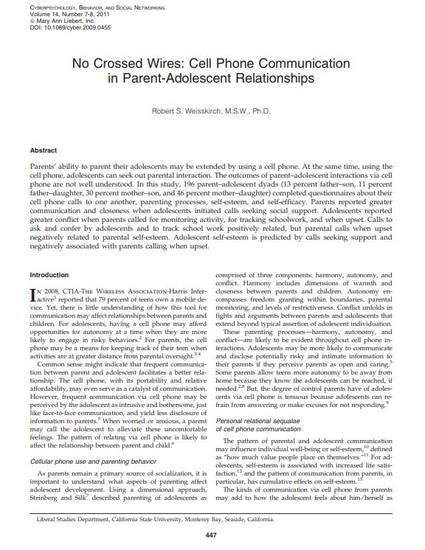
Article
No Crossed Wires: Cell Phone Communication in Parent-Adolescent Relationships
Cyberpsychology, Behavior, and Social Networking
(2011)
Abstract
Parents’ ability to parent their adolescents may be extended by using a cell phone. At the same time, using the cell phone, adolescents can seek out parental interaction. The outcomes of parent–adolescent interactions via cell phone are not well understood. In this study, 196 parent–adolescent dyads (13 percent father–son, 11 percent father–daughter, 30 percent mother–son, and 46 percent mother–daughter) completed questionnaires about their cell phone calls to one another, parenting processes, self-esteem, and self-efficacy. Parents reported greater communication and closeness when adolescents initiated calls seeking social support. Adolescents reported greater conflict when parents called for monitoring activity, for tracking schoolwork, and when upset. Calls to ask and confer by adolescents and to track school work positively related, but parental calls when upset negatively related to parental self-esteem. Adolescent self-esteem is predicted by calls seeking support and negatively associated with parents calling when upset.
Disciplines
Publication Date
2011
DOI
10.1089/cyber.2009.0455
Citation Information
Robert S. Weisskirch. "No Crossed Wires: Cell Phone Communication in Parent-Adolescent Relationships" Cyberpsychology, Behavior, and Social Networking Vol. 14 (2011) p. 447 - 451 Available at: http://works.bepress.com/rob-weisskirch/16/
